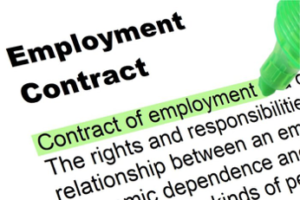 The court in Oakes v. Barnes & Noble College Booksellers, Cal. App. Unpub. LEXIS 2787 (2017) has provided an interesting take on “at-will” employment agreements and the effect that employee handbooks have on them. At issue in this case is whether Christine Oakes, a former Barnes & Noble manager, may file suit for wrongful termination if she was employed on an at-will basis. The court has reasoned that while at-will employment continues to bar such suits, an employee would be allowed to move forward with their claim if they can show that an implied contract that their employment would only be terminated for cause existed.
The court in Oakes v. Barnes & Noble College Booksellers, Cal. App. Unpub. LEXIS 2787 (2017) has provided an interesting take on “at-will” employment agreements and the effect that employee handbooks have on them. At issue in this case is whether Christine Oakes, a former Barnes & Noble manager, may file suit for wrongful termination if she was employed on an at-will basis. The court has reasoned that while at-will employment continues to bar such suits, an employee would be allowed to move forward with their claim if they can show that an implied contract that their employment would only be terminated for cause existed.
Here, the court held that a progressive discipline policy within Barnes & Noble’s employee handbook supported Oakes’ argument that her employment was not at-will. Furthermore, the effect of a failure to properly inform an employee what “at-will” means is potentially at issue here, as the court has taken note of Oakes’ understanding that she would “have to do something to the company” in order be let go. Evidence that Oakes was instructed to follow the discipline system before terminating other “at-will” employees was also taken into consideration in allowing the claim against Barnes & Noble to move forward.
There are a couple points that employers can learn from this case. First, if you employ employees on an at-will basis, you should ensure that they are properly advised as to what it means to be an at-will employee. Having your employees sign an acknowledgement with a proper description of an “at-will” employment is helpful. Second, if you have a progressive discipline system in place, you should ensure that the progressive discipline policy is followed before termination. The law is not entirely clear when it comes to this area of law and having a complete paper trail will help you if a claim arises.
This blog is written by Nezar Habhab, law clerk.



